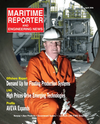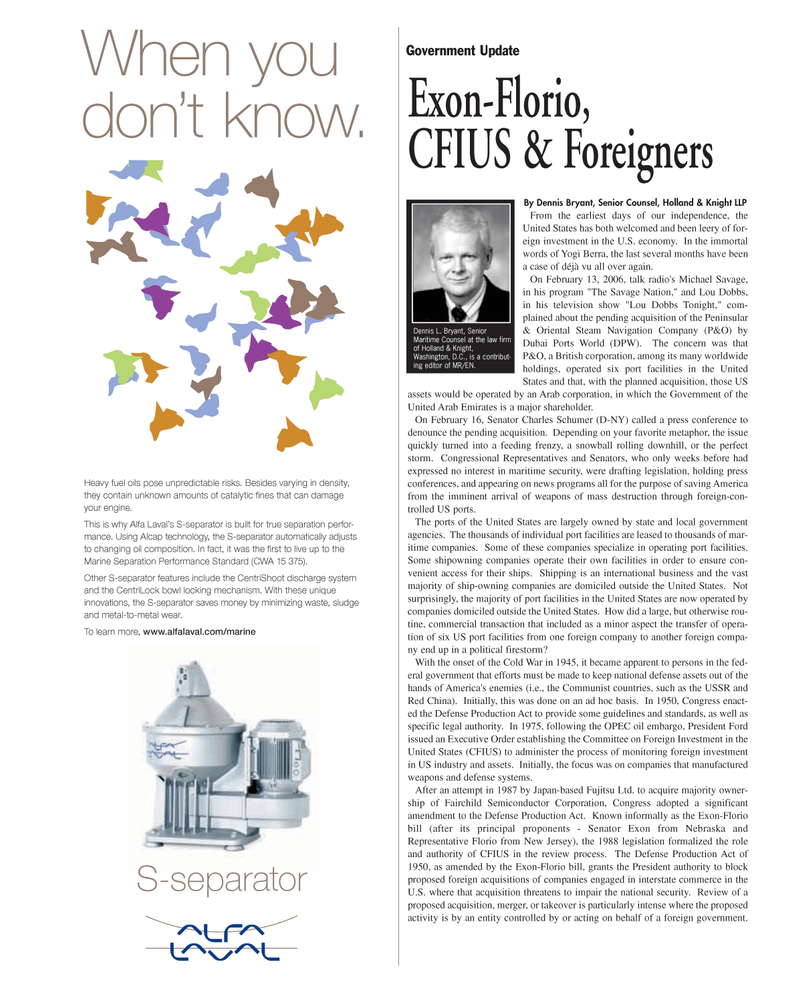
Page 22: of Maritime Reporter Magazine (April 2006)
The Offshore Industry Annual
Read this page in Pdf, Flash or Html5 edition of April 2006 Maritime Reporter Magazine
Exon-Florio,
CFIUS & Foreigners
By Dennis Bryant, Senior Counsel, Holland & Knight LLP
From the earliest days of our independence, the
United States has both welcomed and been leery of for- eign investment in the U.S. economy. In the immortal words of Yogi Berra, the last several months have been a case of déjà vu all over again.
On February 13, 2006, talk radio's Michael Savage, in his program "The Savage Nation," and Lou Dobbs, in his television show "Lou Dobbs Tonight," com- plained about the pending acquisition of the Peninsular & Oriental Steam Navigation Company (P&O) by
Dubai Ports World (DPW). The concern was that
P&O, a British corporation, among its many worldwide holdings, operated six port facilities in the United
States and that, with the planned acquisition, those US assets would be operated by an Arab corporation, in which the Government of the
United Arab Emirates is a major shareholder.
On February 16, Senator Charles Schumer (D-NY) called a press conference to denounce the pending acquisition. Depending on your favorite metaphor, the issue quickly turned into a feeding frenzy, a snowball rolling downhill, or the perfect storm. Congressional Representatives and Senators, who only weeks before had expressed no interest in maritime security, were drafting legislation, holding press conferences, and appearing on news programs all for the purpose of saving America from the imminent arrival of weapons of mass destruction through foreign-con- trolled US ports.
The ports of the United States are largely owned by state and local government agencies. The thousands of individual port facilities are leased to thousands of mar- itime companies. Some of these companies specialize in operating port facilities.
Some shipowning companies operate their own facilities in order to ensure con- venient access for their ships. Shipping is an international business and the vast majority of ship-owning companies are domiciled outside the United States. Not surprisingly, the majority of port facilities in the United States are now operated by companies domiciled outside the United States. How did a large, but otherwise rou- tine, commercial transaction that included as a minor aspect the transfer of opera- tion of six US port facilities from one foreign company to another foreign compa- ny end up in a political firestorm?
With the onset of the Cold War in 1945, it became apparent to persons in the fed- eral government that efforts must be made to keep national defense assets out of the hands of America's enemies (i.e., the Communist countries, such as the USSR and
Red China). Initially, this was done on an ad hoc basis. In 1950, Congress enact- ed the Defense Production Act to provide some guidelines and standards, as well as specific legal authority. In 1975, following the OPEC oil embargo, President Ford issued an Executive Order establishing the Committee on Foreign Investment in the
United States (CFIUS) to administer the process of monitoring foreign investment in US industry and assets. Initially, the focus was on companies that manufactured weapons and defense systems.
After an attempt in 1987 by Japan-based Fujitsu Ltd. to acquire majority owner- ship of Fairchild Semiconductor Corporation, Congress adopted a significant amendment to the Defense Production Act. Known informally as the Exon-Florio bill (after its principal proponents - Senator Exon from Nebraska and
Representative Florio from New Jersey), the 1988 legislation formalized the role and authority of CFIUS in the review process. The Defense Production Act of 1950, as amended by the Exon-Florio bill, grants the President authority to block proposed foreign acquisitions of companies engaged in interstate commerce in the
U.S. where that acquisition threatens to impair the national security. Review of a proposed acquisition, merger, or takeover is particularly intense where the proposed activity is by an entity controlled by or acting on behalf of a foreign government.
When you don’t know.
S-separator
Heavy fuel oils pose unpredictable risks. Besides varying in density, they contain unknown amounts of catalytic fi nes that can damage your engine.
This is why Alfa Laval’s S-separator is built for true separation perfor- mance. Using Alcap technology, the S-separator automatically adjusts to changing oil composition. In fact, it was the fi rst to live up to the
Marine Separation Performance Standard (CWA 15 375).
Other S-separator features include the CentriShoot discharge system and the CentriLock bowl locking mechanism. With these unique innovations, the S-separator saves money by minimizing waste, sludge and metal-to-metal wear.
To learn more, www.alfalaval.com/marine
Government Update
Dennis L. Bryant, Senior
Maritime Counsel at the law firm of Holland & Knight,
Washington, D.C., is a contribut- ing editor of MR/EN.
MR APRIL2006 #3 (17-24).qxd 4/3/2006 11:15 AM Page 22

 21
21

 23
23
